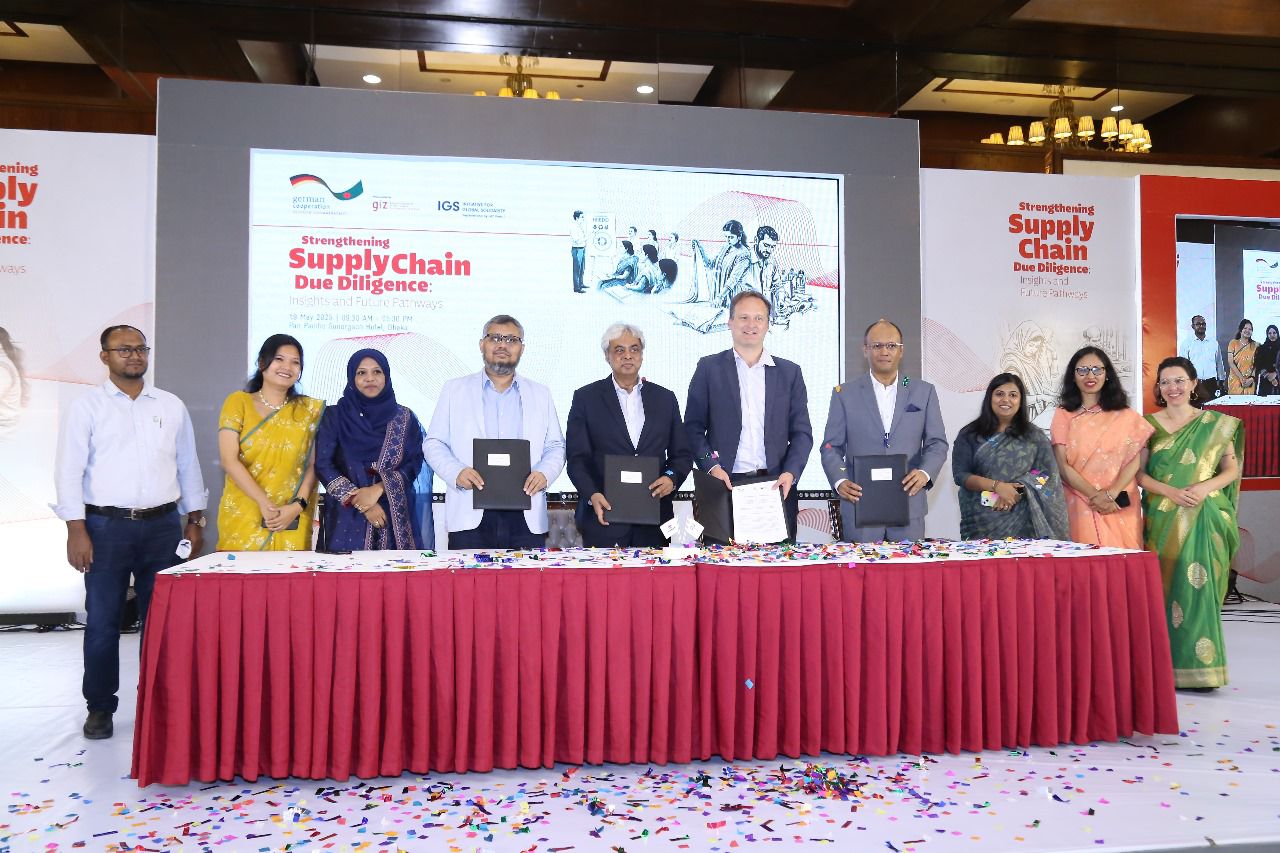

The Initiative for Global Solidarity (IGS), implemented by Deutsche Gesellschaft für Internationale Zusammenarbeit (GIZ) GmbH on behalf of the German Federal Ministry for Economic Cooperation and Development (BMZ), successfully hosted the event Strengthening Supply Chain Due Diligence: Insights and Future Pathways at the Pan Pacific Sonargaon in Dhaka on 19th May 2025 Monday. The event, moderated by Sadia Raisa Khan from GIZ, brought together industry leaders, government officials, and stakeholders to discuss responsible business practices and human rights within supply chains.
The event began with a welcome speech by Werner Lange, Cluster Coordinator from GIZ, who emphasized the importance of due diligence in supply chains. Following the welcome speech, Ulrich Kleppmann from the German Embassy Dhaka highlighted the role of the Responsible Business Hub network: “As part of the Responsible Business Hub (RBH) network initiated by IGS, BGMEA and BKMEA are demonstrating proactive engagement with global due diligence standards. Moving forward, the full ownership of the Responsible Business Hubs by the industry associations is key, with the German development cooperation taking on a supportive role.”
The signing of a Memorandum of Understanding (MoU) between GIZ and BGMEA and BKMEA formalizes their commitment to continue their work on due diligence within the RBH structure.
Mr. Fazlee Shamim Ehsan, Executive President, BKMEA, Mr. Md. Anwar Hossain, Administrator BGMEA, and Dr. Michael Klode, GIZ, were present at the signing of the ceremony.
Regarding the objective of the MoU, GIZ’s Project Head Dr. Michael Klode said, “We are working on sustainable development across the globe. The IGS project works on due diligence in eight countries worldwide, including Bangladesh. Through this agreement, our cooperation will continue to strengthen and ensure the success of the Responsible Business Hub in Bangladesh (RBH) and its activities in Bangladesh’s ready-made garment sector. We believe that the development of the industry is a collective effort.”
The event featured several insightful sessions, including a presentation by Dr. Carla Dohmwirth from GIZ on the highlights of the Global Programme Initiative for Global Solidarity.
Prof. Surya Deva from Macquarie University provided a global perspective on business and human rights, setting the stage for discussions on responsible business practices. Moving forward, it is essential to strengthen the partnerships between government, civil society, and other stakeholders. Beyond addressing compliance requirements, building trust and fostering transparent, responsible practices are important.
The presentation on RBHs in Bangladesh shared insights on the current role of the RBH, which serves as an information and resource center. Speakers Sheikh Shuchita Jahan Sneha, (BGMEA) and Farzana Sharmin (BKMEA) emphasized that the RBH’s objectives are well aligned with the priorities of BGMEA and BKMEA. The RBH focuses on training, capacity building, monitoring, and business advocacy, while guiding manufacturers on the Human Rights and Environmental Due Diligence (HREDD) standards and requirements.
The first panel discussion titled “Industry perspective on HREDD”, with participation from Wasim Zakaria (BGMEA), Fazlee Shamim Ehsan (Executive President, BKMEA), Syed Jonyed Mostafa (Social and Labour Manager, Bestseller), Mohammed Zahidullah (Chief Sustainability Officer, DBL Group) was moderated by Dr. Michael Klode from GIZ.
Another panel discussion focused on “Workers’ perspective on HREDD & meaningful stakeholder engagement”, featuring Faiza Farah Tuba (Laudes Foundation), Dr. Krishna Kumar Saha (Cumilla University), Atiqur Rahman Shuvo (Safety and Rights Society - SRS) and Kalpona Akter (Bangladesh Center for Workers Solidarity -BCWS). The session was moderated by Laila Tasmia of GIZ.
In addition to these sessions Laetitia Weidel Roberts (ILO Better Work), Sara Kifayath Kotha and Nahida Anjum Kona (Fair Wear Foundation) shared their experiences with grievance mechanisms at factory-level in this session.
The event also included a role-play by RMG workers, highlighting the importance of anti-harassment committees within the workplace.
